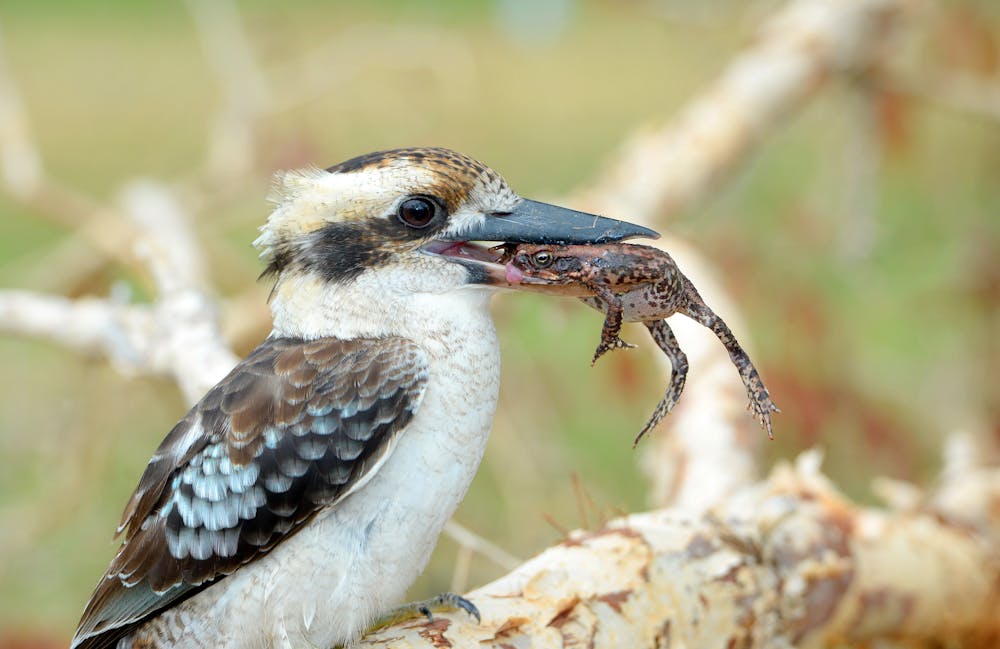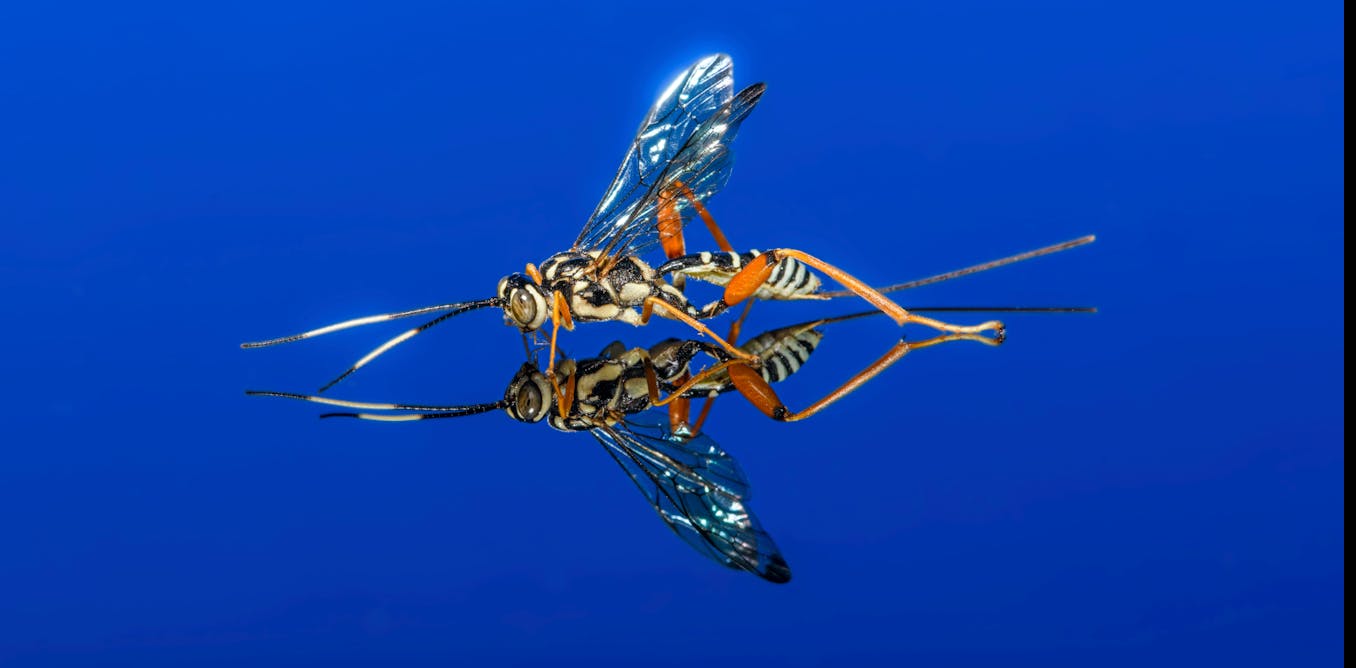Wasps have a reputation for being jerks because of their perceived aggressiveness and ability to sting repeatedly. They’re often negatively compared with the honey production and agricultural pollination of bees.
If wasps are jerks, however, they are positively saintly compared to their parasitic brethren.
Parasitic wasps sting to inject their eggs into a host, often accompanied by venom and a virus. Their larvae grow and eventually emerge from the unwitting host — usually killing it. Then they becoming adults and fly off to continue the cycle.
Some wasps go further, controlling their host’s behaviour, effectively “zombifying” them to help the larva survive. After studying the behaviour of ichneumon wasps, which lay their eggs in moth larvae, naturalist Charles Darwin wrote that they were so evil that they were proof against the idea that God was directing evolution:
While no wasps are known to lay eggs in humans (although some flies do), they have inspired films like the Alien franchise and the recently released monster survival video game House of Ashes.
But whether inspiring horror or metaphysical questions, parasitic wasps also save millions of human lives.
In the 1970s, the cassava mealybug (Phenacoccus manihoti) entered Western and Central Africa as an invasive pest species from Brazil. It rapidly spread across cassava fields causing crop losses as high as 80 per cent. The cassava plant is a staple food crop because it is drought-resistant. The mealybug invasion threatened the food base of 200 million people.
The Swiss entomologist Hans Rudolf Herren, who was conducting research in the area, found a wasp parasitizing the mealybug (Epidinocarsis lopezi). The parasitic wasp posed little risk to sub-Saharan species.
After rearing the wasps and gathering funding, Herren bought planes and co-ordinated strategic airdrops and ground release of wasp cocoons to areas affected by the mealybug. From those locations, the wasp populations grew and spread on their own, reducing the mealybug population to manageable levels for years.
This effort saved an estimated 20 million lives, billions in crops and avoided the use of pesticides. Herren received the World Food Prize in 1995 for his efforts.
Biocontrol is the use of one organism to combat a pest, and this was far from the only successful case of wasps as biocontrol. Wasps have successfully defended against many crop pests in Chinese agriculture.
The samurai wasp (Trissolcus japonicus) was being studied for potential use against the brown marmorated stinkbug, a threat to many crops across the continental United States. However, the wasp preempted this, moving into stinkbug territories on its own.
Wasps are even being deployed to prevent moths from damaging historical sites and their artifacts. Here in Canada, at least four wasp species have been released to control the emerald ash borer, a cause of deforestation across Canada.
Biocontrol has several advantages over pesticides. Populations can grow and spread on their own, as demonstrated by the samurai wasps, whereas pesticides typically need humans to spread them. Organisms can maintain their presence over the long-term without human intervention, while pesticides often require repeat applications. Pests can also evolve to resist pesticides in as few as 20 generations. And as biocontrol uses another organism, they can evolve in response the pest’s defences.
Biocontrol is not free from issues. It often introduces a new invasive species to deal with an existing one. It can be difficult to predict the effects of a new species on an unprepared ecosystem.
For example, the cane toad was introduced in Australia to eat several insect pests there. Instead, the poisonous toad became a lethal meal for several native species, disrupting many other parts of the ecosystems there.

A laughing kookaburra eats a cane toad. Some kookaburras die from ingesting the poisonous toads.
Parasites may avoid some of these issues as, unlike predators, they are often limited to a single or very few host species, making them less likely to go off-target and affect species other than the intended one.
Given that most agricultural pests are insects and most pest insects are targeted by at least one parasitic wasp (there are an estimated 750,000 parasitic wasp species), this gives a legion of options to study for safe and effective pest management.
So next time you’re online and see wasps being unfairly maligned, consider the millions of humans across the world who are alive and able to feed themselves because of them. And maybe this upcoming Halloween, should you encounter the spirit of a certain 1800s English naturalist going on about the theological implications of parasitic wasps’ evil, tell him of the good they can do.

 theconversation.com
theconversation.com
Not really news but more of a conversational topic, still I had no way of resisting my desire to share this article here for the people who are willing to give it a read
If wasps are jerks, however, they are positively saintly compared to their parasitic brethren.
Parasitic wasps sting to inject their eggs into a host, often accompanied by venom and a virus. Their larvae grow and eventually emerge from the unwitting host — usually killing it. Then they becoming adults and fly off to continue the cycle.
Some wasps go further, controlling their host’s behaviour, effectively “zombifying” them to help the larva survive. After studying the behaviour of ichneumon wasps, which lay their eggs in moth larvae, naturalist Charles Darwin wrote that they were so evil that they were proof against the idea that God was directing evolution:
While no wasps are known to lay eggs in humans (although some flies do), they have inspired films like the Alien franchise and the recently released monster survival video game House of Ashes.
But whether inspiring horror or metaphysical questions, parasitic wasps also save millions of human lives.
Parasitic wasps to the rescue
In the 1970s, the cassava mealybug (Phenacoccus manihoti) entered Western and Central Africa as an invasive pest species from Brazil. It rapidly spread across cassava fields causing crop losses as high as 80 per cent. The cassava plant is a staple food crop because it is drought-resistant. The mealybug invasion threatened the food base of 200 million people.
The Swiss entomologist Hans Rudolf Herren, who was conducting research in the area, found a wasp parasitizing the mealybug (Epidinocarsis lopezi). The parasitic wasp posed little risk to sub-Saharan species.
After rearing the wasps and gathering funding, Herren bought planes and co-ordinated strategic airdrops and ground release of wasp cocoons to areas affected by the mealybug. From those locations, the wasp populations grew and spread on their own, reducing the mealybug population to manageable levels for years.
This effort saved an estimated 20 million lives, billions in crops and avoided the use of pesticides. Herren received the World Food Prize in 1995 for his efforts.
Biocontrol heroes
Biocontrol is the use of one organism to combat a pest, and this was far from the only successful case of wasps as biocontrol. Wasps have successfully defended against many crop pests in Chinese agriculture.
The samurai wasp (Trissolcus japonicus) was being studied for potential use against the brown marmorated stinkbug, a threat to many crops across the continental United States. However, the wasp preempted this, moving into stinkbug territories on its own.
Wasps are even being deployed to prevent moths from damaging historical sites and their artifacts. Here in Canada, at least four wasp species have been released to control the emerald ash borer, a cause of deforestation across Canada.
Pros and cons
Biocontrol has several advantages over pesticides. Populations can grow and spread on their own, as demonstrated by the samurai wasps, whereas pesticides typically need humans to spread them. Organisms can maintain their presence over the long-term without human intervention, while pesticides often require repeat applications. Pests can also evolve to resist pesticides in as few as 20 generations. And as biocontrol uses another organism, they can evolve in response the pest’s defences.
Biocontrol is not free from issues. It often introduces a new invasive species to deal with an existing one. It can be difficult to predict the effects of a new species on an unprepared ecosystem.
For example, the cane toad was introduced in Australia to eat several insect pests there. Instead, the poisonous toad became a lethal meal for several native species, disrupting many other parts of the ecosystems there.

A laughing kookaburra eats a cane toad. Some kookaburras die from ingesting the poisonous toads.
Parasites may avoid some of these issues as, unlike predators, they are often limited to a single or very few host species, making them less likely to go off-target and affect species other than the intended one.
Given that most agricultural pests are insects and most pest insects are targeted by at least one parasitic wasp (there are an estimated 750,000 parasitic wasp species), this gives a legion of options to study for safe and effective pest management.
So next time you’re online and see wasps being unfairly maligned, consider the millions of humans across the world who are alive and able to feed themselves because of them. And maybe this upcoming Halloween, should you encounter the spirit of a certain 1800s English naturalist going on about the theological implications of parasitic wasps’ evil, tell him of the good they can do.

Parasitic wasps turn other insects into ‘zombies,’ saving millions of humans along the way
Parasitic wasps are body-snatchers — if you’re an insect. But these much-maligned creatures have saved millions of human lives by controlling the spread of the cassava mealybug.
 theconversation.com
theconversation.com Not really news but more of a conversational topic, still I had no way of resisting my desire to share this article here for the people who are willing to give it a read





